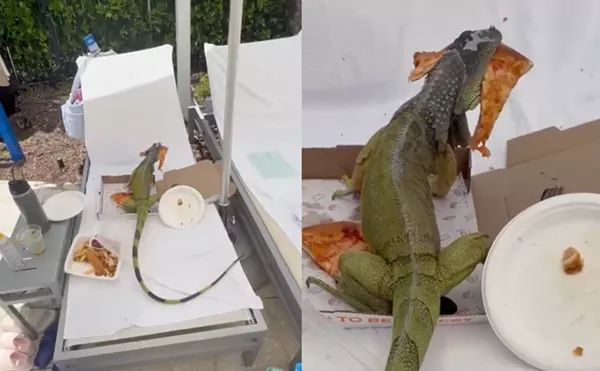“I just got tired of throwing so much crap away,” Verde Market convert Buster Brown tells New Times during a recent conversation in South Miami. The self-described locavore and kombucha brewer extends a business card with the zero-waste grocer’s logo on the front. “If you find yourself feeling the same way, you should check it out.”
With two Miami locations, Verde Market is a zero-waste grocery store brand.
As the name implies, such shops sell goods sans landfill-clogging packaging. At Verde Market, that means shoppers are encouraged to bring their own empties to fill with the wide range of products on offer – from dried garbanzo beans to blood orange-infused olive oil to powdered spirulina, lavender floor cleaner, and peppermint eucalyptus body lotion, to name a handful of the more than 300 products on offer.
Upon entering the store, shoppers weigh their own containers on a clever machine that records the tare weights in reusable digital "tags" that are then draped around the bottles, jars, or tubs. (Reusable containers are also available for purchase.) Customers then fill their empties with dry goods from large glass jars, nut butters fresh from the grinder, and liquids from multigallon pour-spout containers.
Co-owner and cofounder Pam Varrera came upon the concept in early 2018 because she, like her customer Buster Brown, found herself feeling sick of looking at her garbage.
"My trash can was just filling up with containers every week. I started keeping them. They were still in good shape. I looked around for a place to refill them, and found nothing," she says. "So I went to my business partner, Martha Valaguer, and said, 'Maybe we should try to create something.' Would it work? We didn't know. But so far, we are here, and now we're opening our third store."
Even a single Publix run can run up a high environmental tab – plastic grocery bags, plastic produce bags, plastic drink, detergent, and toiletry bottles, all of which contribute to the nearly 36 million tons of plastic Americans generate each year according to the most recent data from the U.S. Environmental Protection Agency. Meanwhile, the national recycling rate for plastics is a measly 8.7 percent. In Miami, factors like high contamination of recyclables due to misunderstandings regarding what is recyclable, as well as low demand for the recyclable materials collected, result in one of the lowest overall recycling rates in the state of Florida.
"Even if we can recycle something, you can usually only do so a few times," Varrera adds, noting that the quality of the polymers degrade with each turn through the recycling process.
Clearly, buying heavily packaged products and tossing the waste in the recycling bin on a wing and a prayer is not panning out for Mother Earth. This reality is why zero-waste stores like Verde Market have sprouted up across the country with a different approach.
"That customer just came in and refilled that big Tide bottle with laundry detergent," Varrera says, referring to a woman who'd just checked out. "She's been refilling that same bottle for a year and a half. We have reduced the amount of trash going to the landfills and oceans, one bottle at a time."
Certainly, shopping without waste generation is more sustainable for the planet. But if done consistently and wisely, it can save money, too. Consumers can buy exactly what they need — no more buying a quart of molasses when your recipe calls for three tablespoons — at prices that benefit from not having to cover the cost of papers, plastics, and inks involved in product packaging.
"We set our prices with Amazon. If we cannot compete with their prices on a comparable product, we don't sell it," Varrera says. She stipulates that the store only stocks natural and organic products, so one won't find equivalents to chemical-laden store brands. But she says Verde Market is competitive compared to other natural and organic buying options.
On a recent shopping trip, a purchase of the makings of a gourmet trail mix (Brazil nuts, dates, dried papaya, pistachios, and hazelnuts), candied ginger, sesame sticks, and a spray bottle filled with enough cleaning powder to make 16 ounces of bathroom-cleaning solution rang up at just over $6.
While Verde Market sells almost everything one needs to maintain the body and home, shoppers have to procure their produce elsewhere. On that count, the grocer offers reusable and compostable produce bags to help customers continue their zero-waste shopping in other locales.
Verde’s owners don’t participate in heavy marketing initiatives, Varrera says. In fact, she describes Verde Market's marketing budget as "zero dollars." She's not big on Instagram or even updating the shop's website, which still lists the number of products offered as 200, though the number has grown by 50 percent.
Instead, the market relies on enthusiastic customers to spread the word — organically.
"We need more people to break their habits, which is not easy, but once you try, you can make a difference,” Varrera says. "Each of our actions matters." Verde Market. Two area locations: at 2328 NE Second Ave., Miami; and 7303 SW 57th Ave., South Miami. A third location is slated to open at 2102 E. Oakland Park Blvd., Fort Lauderdale, in November. verdemarketonline.com.

Audio By Carbonatix
[
{
"name": "GPT - Billboard - Slot Inline - Content - Labeled - No Desktop",
"component": "16971022",
"insertPoint": "2",
"requiredCountToDisplay": "2"
},{
"name": "STN Player - Float - Mobile Only ",
"component": "18617832",
"insertPoint": "2",
"requiredCountToDisplay": "2"
},{
"name": "Editor Picks",
"component": "15769925",
"insertPoint": "4",
"requiredCountToDisplay": "1"
},{
"name": "Inline Links",
"component": "16575154",
"insertPoint": "8th",
"startingPoint": 8,
"requiredCountToDisplay": "7",
"maxInsertions": 25
},{
"name": "GPT - Rectangle 2x - Slot Auto-select - Labeled",
"component": "15782206",
"insertPoint": "8th",
"startingPoint": 8,
"requiredCountToDisplay": "7",
"maxInsertions": 25
},{
"name": "Inline Links",
"component": "16575154",
"insertPoint": "8th",
"startingPoint": 12,
"requiredCountToDisplay": "11",
"maxInsertions": 25
},{
"name": "GPT - Leaderboard to Tower - Slot Auto-select - Labeled",
"component": "15782207",
"insertPoint": "8th",
"startingPoint": 12,
"requiredCountToDisplay": "11",
"maxInsertions": 25
}
]









